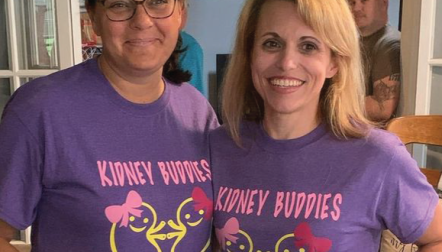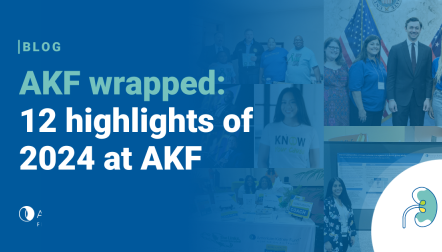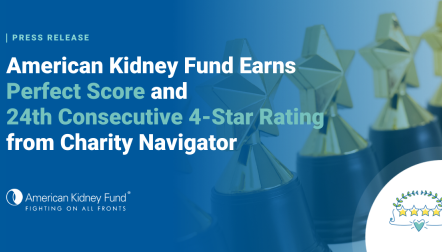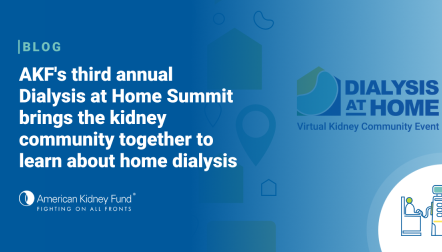
Blog post
AKF's second annual Kidney Action Week delivers kidney disease education to thousands

From Sept. 13-17, the American Kidney Fund (AKF) held its second annual Kidney Action Week — a week-long, virtual event with sessions covering all things kidney health. With more than 2,300 people joining our sessions on the Kidney Action Week website throughout the week, plus another 9,150 session views on Facebook and YouTube, the interest and attendance blew AKF's expectations out of the water.
If you were unable attend any Kidney Action Week sessions, fear not! All of them were recorded and can be viewed for free and at your convenience at KidneyActionWeek.org. Here are a few of our favorite sessions that we suggest watching:
Hypertension, Diabetes and Kidney Disease: Understanding the Connection
The American Heart Association and American Diabetes Association, whose Know Diabetes By Heart™ collaboration AKF recently joined, partnered with us for this session, as kidney disease, diabetes and heart disease are all very closely linked. Having one of those diseases puts you at increased risk for developing the other two, regardless of which you have. The link between them is so strong that some diabetes medications may also improve heart and kidney health.
The session featured a cardiologist, endocrinologist and nephrologist, and while each talked about their respective specialties and how to stay healthy, the biggest takeaway was that the only way to avoid one of these diseases is to ensure you take steps to control them all.
Home Dialysis and the Patient Experience: Could Home Dialysis be for You?
It is not easy to live a "normal" life while on dialysis. Not only does it take hours out of your day, but you have to plan your schedule around your treatments.
For those who are eligible, home dialysis can be a great way to make dialysis fit into your life. In this session, Dr. Rachel Perlman, a nephrologist, joined AKF Ambassadors Leigh-Ann Williams and Nieltje Gedney, the executive director of Home Dialyzors United, to discuss the advantages and disadvantages of home dialysis.
The three panelists did a great job explaining that while home dialysis may take more effort since you conduct your own treatments, the flexibility it affords can be life changing. Dr. Perlman said it best when she said that dialysis should be about feeling your best and enjoying your life, and not just a treatment to help you get by.
Leigh-Ann echoed that sentiment, saying that the ability to plan her dialysis treatments around her schedule, and not the other way around, is what has allowed her to go back to work, volunteer in her community and travel.
Ask a Nephrologist: Audience Q&A featuring Dr. Blake Shusterman, The Cooking Doc ®
Food can be delicious and good for your kidneys. During this session, Dr. Blake Shusterman, a South Carolina-based nephrologist and cooking enthusiast known as The Cooking Doc, shared his passion for helping people with kidney disease enjoy healthy, kidney-friendly foods. Dr. Shusterman is also a partner on AKF's Kidney Kitchen®, so he knows that if you cannot find a way to make your food enjoyable, you are not going to be able to maintain the kidney-friendly food and fluid plan recommended by your doctor and dietitian.
Kidney-friendly eating is not about permanently cutting out your favorite foods, it is about finding ways to eat them in moderation. For example, if you love tomatoes, having kidney disease does not mean you can never have them again. Sure, you might not be able to eat all the tomatoes you want due to their higher levels of potassium, but including them in a salad or having a slice here or there? That is fine!
It is also important to remember that there is not one kidney-friendly eating plan that works for everyone — a myth Dr. Shusterman hears frequently. He shared that you should be eating for your stage of kidney disease and individual lab results. "When people look on the Internet and look for a 'kidney [eating plan],' they just kind of get lumped into the most restrictive kidney [eating plan], which does not apply to most people with kidney disease," he said.
The Kidney Transplant Process: What You Need to Know
For people living with kidney failure, the kidney transplant waiting list is a long process, and it is one that is not guaranteed to pay off. Because of that uncertainty, Helen Christensen and Dr. Elaine Ku, a former AKF Clinical Scientist in Nephrology Fellow, talked about the importance of trying to get a kidney from a living donor. Not only does finding a living donor speed up the transplant process and prevent lengthy waits on the organ transplant list, there is another distinct advantage to having a live donor — on average, a kidney transplant from a live donor lasts five years longer than one from a deceased donor.
Finding a living donor involves being unafraid to ask your community for help. It is natural for many people to hide medical problems from their friends and family so as to not burden others with their problems, but that is the exact opposite of what someone with kidney failure should be doing. You never know who will be willing to help you.
Michael and LeighAnn Saylor, both AKF Ambassadors, did not know who would be willing to donate a kidney to Michael when he needed one. They told the inspirational story of how he eventually received his transplant 10 years ago. While the man who ended up giving Michael a kidney is now someone they consider family and a second father to their kids, that was not always the case. In fact, when he donated his kidney to Michael, they had not seen each other since high school — proof that asking your extended network to become your living donor can pay off.
Missed Kidney Action Week?
Above are just four of the 14 sessions from an amazing Kidney Action Week! If you missed these sessions, or any others, check out the Kidney Action Week website for the full videos from each day's events. You can also watch our very educational Kidney Action Week Congressional briefing, Increasing Kidney Transplants in Communities of Color, which explored the reasons people of color are disproportionately affected by kidney failure, often spend longer on the transplant waiting list, have less access to living donor kidney transplants and often experience shorter survival time of transplanted kidneys.
We hope you will join us for next year's Kidney Action Week!
Kidney Action Week was made possible by the generosity of sponsors Boehringer Ingelheim/Lilly, Otsuka America Pharmaceutical, Inc. and US Renal Care.
AKF is also grateful to session sponsors AstraZeneca, Alexion Pharmaceuticals, GSK, Horizon Therapeutics plc, Natera, Sanofi Genzyme, Travere and Vertex Pharmaceuticals.






